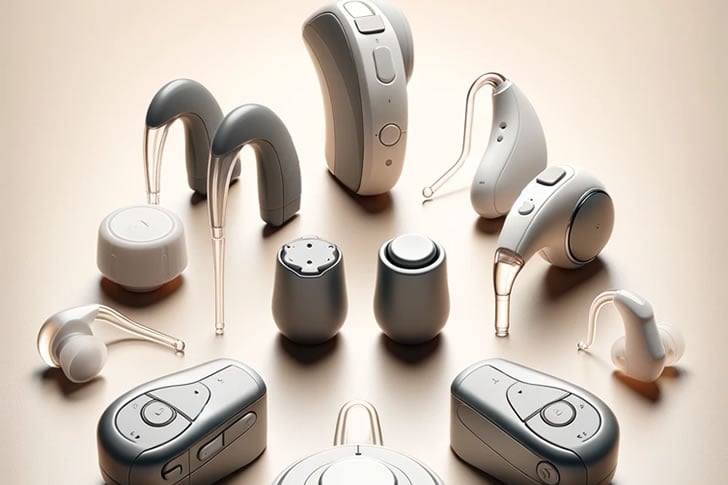As we step into 2025, the landscape of hearing aids is undergoing a remarkable transformation, propelled by advances in modern technology. This leap into a new era not only enhances the quality of life for millions of individuals with hearing loss but also integrates seamlessly with our increasingly digital lifestyles.

The Evolution of Hearing Aids
Historically speaking, hearing aids were bulky devices—often more of a burden than a convenience. The 20th century saw the birth of rudimentary sound amplifiers that merely magnified sound, rather than addressing specific frequency needs. Fast forward to the present, and we encounter a different narrative altogether.
Today’s hearing aids are sleek, lightweight, and powered by sophisticated algorithms and miniaturized technology. The introduction of digital signal processing (DSP) has been revolutionary. These devices now analyze sound environments in real-time, allowing wearers to focus on conversations while filtering out background noise—a significant improvement over past offerings.
Smart Integration: Bridging the Gap Between Hearing and Connectivity
In 2025, the fusion of hearing aids and smart technology is a game-changer. More than just auditory devices, modern hearing aids double as smart earbuds, connecting seamlessly to smartphones, smartwatches, and even smart home devices.
1. Bluetooth Capabilities: Many of today’s hearing aids come equipped with Bluetooth technology, allowing users to stream music, phone calls, and podcasts directly into their devices. This not only improves access to audio content but also enhances the overall experience of sound—making conversations clearer and more engaging.
2. Advanced Apps: With a simple tap on a smartphone, users can adjust their hearing aid settings, control sound environments, and even connect with audiologists for remote consultations. Apps such as “Oticon ON” and “Phonak Remote” offer an intuitive interface, making hearing management incredibly personalized and user-friendly.
Health Monitoring: More Than Just Hearing
Beyond improving auditory capabilities, today’s hearing aids are beginning to take on additional roles in health monitoring. With integrated sensors, users can track various health metrics, including heart rate and physical activity levels. This innovative approach not only fosters a sense of well-being but also positions hearing aids as multifunctional health devices.
Imagine receiving an alert about your declining fitness level while attending a gathering, enabling you to adjust your activities accordingly. This convergence of hearing assistance and health monitoring indicates a promising shift towards holistic care.
The Social Repercussions: Changing Perceptions
The integration of advanced technology into hearing aids has also sparked a profound social shift. In 2025, the stigma traditionally associated with wearing hearing aids is gradually dissolving. The modern aesthetic of these devices, combined with their capabilities, promotes a more accepting attitude toward hearing loss.
Manufacturers are pushing the narrative of empowerment rather than limitation—encouraging individuals to embrace their hearing aids as an essential element of their identity rather than a hindrance. Social media platforms and influencers are spearheading this change, celebrating personal stories of resilience and adaptability.
The Road Ahead: Challenges and Opportunities
Yet, amidst this optimism, challenges remain. With a plethora of options on the market, how do users choose the right hearing aid? Accessibility and affordability continue to be significant barriers for many, necessitating advocacy for wider access and better insurance coverage.
Furthermore, as technology rapidly evolves, keeping pace with updates can be overwhelming. Providers and manufacturers must work collaboratively to create user-friendly systems that prioritize the needs of wearers.
Conclusion: A Bright Future Ahead
As we embrace 2025, the advancements in hearing aids and modern technology present an exciting horizon filled with possibilities. The synergy of connectivity, health monitoring, and evolving social perceptions heralds a new era of inclusion and empowerment for individuals with hearing loss.
Together, we can celebrate this remarkable journey, recognizing that sound—a fundamental aspect of human connection—is becoming more accessible, adaptable, and integrated into our digital futures. In this ever-evolving landscape, the future of hearing is not just about hearing—it’s about thriving.
Jake Reynolds
With a background in sociology, Jake brings a unique perspective to lifestyle topics, focusing on how societal trends shape our daily lives. He has contributed to numerous online platforms, discussing everything from sustainable living to technology's impact on personal wellness. Outside of work, Jake is an avid runner and enjoys documenting his adventures through photography and social media, inspiring others to lead active and fulfilling lives.

Explore the Tranquil Bliss of Idyllic Rural Retreats

Ultimate Countdown: The 20 Very Legendary Gaming Consoles Ever!

Understanding Halpin and its Influence

Affordable Full Mouth Dental Implants Near You

Discovering Springdale Estates

Illinois Dentatrust: Comprehensive Overview

Embark on Effortless Adventures: Unveiling the Top in Adventures Made Easy Outdoor Equipment

Unveiling Ossur Valves: Innovation in Prosthetics

Unlock the Full Potential of Your RAM 1500: Master the Art of Efficient Towing!
